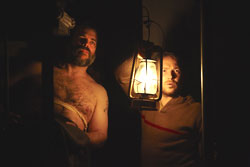Review: Early Plays

Although the stage seems bare for The Wooster Group’s production of Eugene O’Neill’s Early Plays, it actually contains an awful lot of baggage. The troupe is well known for their aggressively avant-garde approach to both new plays and the classics, adorning them with endless amounts of stylized movement and technological trickery. Meanwhile, guest director Richard Maxwell is typified by his minimalistic approach to both text and staging. The result of this unlikely collaboration is interesting if not wholly successful.
Of course, these early works by O’Neill—the production features three of his four one-act Glencairn plays set on or near a steamer and written in the first decade of the 20th century—would seem to defy modern staging. Deeply impressionistic and featuring dense and archaic dialect, they’re impenetrable at times. It’s no wonder that they’ve rarely been done even as the playwright has enjoyed a modern renaissance.
Maxwell’s approach here is to basically accentuate the text above all. And indeed it comes through with reasonable clarity, partly because a wise decision was made to have the actors avoid accents.
But the staging is pretty much non-existent. Performed on the same set that the company used for their production of The Emperor Jones, featuring just some cables and folding chairs (all the technical accoutrements, such as video screens, etc., are absent), the production has the feel of a staged reading…or more precisely, a table reading, and a first one at that. The actors vary wildly in their approaches, with some delivering fully formed, credible characterizations and other reciting their dialogue in a monotone that suggests they’ve never encountered it before.
That’s not to say that some effective atmospheric devices aren’t employed. The second play, Bound East for Cardiff, is performed in near total darkness, with only a spotlight at the rear of the stage to illuminate a couple of the actors. Musicians on the side of the stage provide a properly ominous background score. And the plays are bracketed by original, vintage-sounding songs composed by Maxwell that fit surprisingly well into the proceedings.
But despite some effective moments the production doesn’t manage to bring these works to any kind of vivid life. The task may perhaps be impossible, but it would be nice to see another attempt by a company with greater acting and directorial resources.
St. Ann’s Warehouse, 38 Water St. Brooklyn. 718-254-8779. Through March 11.
| Print article | This entry was posted by Frank on 02/23/12 at 06:20:39 am . Follow any responses to this post through RSS 2.0. |